Israeli Scene
Feature
Israel’s October 7 Refugees
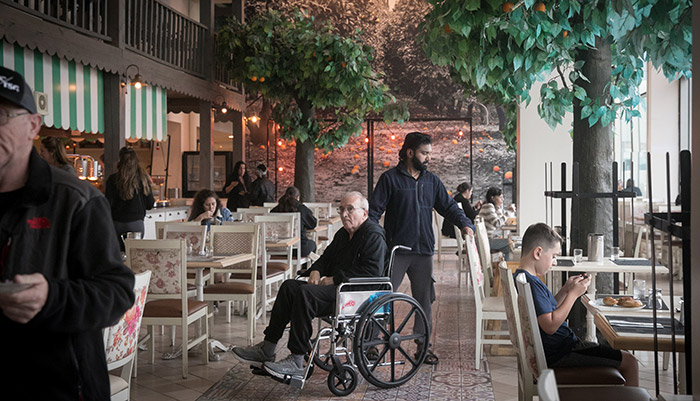
Photo by Miriam Alster/Flash90.
For months, Dorit Zohar has been living in a state of deep uncertainty.
A resident of Tkuma, a moshav less than five miles from the Gaza border, Zohar fled her home along with her husband and three children on Sunday morning, October 8, while Hamas terrorists were still on the loose in southern Israel after their massive surprise attack and infiltration the day before. Speeding through roads strewn with corpses and burning cars while rockets streaked overhead, Zohar’s family eventually reached safety at a youth hostel guest house in Maccabim, a town on the edge of the central Israeli city of Modiin, where someone from her community had sent word of available rooms.
At first, Zohar thought she’d be away from home just for a few days—as with previous rounds of fighting between Israel and Hamas. But it quickly became evident that October 7 was not like previous attacks. Israel soon invaded Gaza, aiming to destroy Hamas and liberate over 250 hostages.
Now, after months of fighting, Israel’s goal of destroying Hamas remains elusive, and Zohar and the more than 100,000 Israelis evacuated from their homes in the Israeli war zones near Gaza in the South and Lebanon in the North are trying to figure out how to pick up the pieces of their lives. Initially, weeks into the war, more than 200,000 Israelis had left their homes.
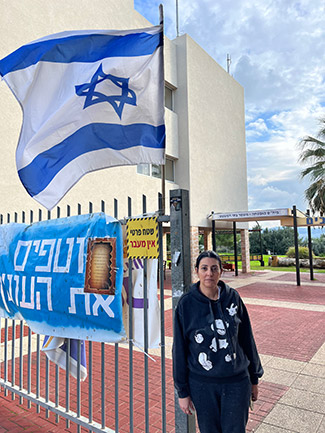
“Like everyone, we’re in dilemmas about the future, how we move forward from here,” Zohar said. “I very much want to return. But it’s complicated.”
Zohar’s home in Tkuma lacks a mamad—the reinforced room that serves as a shelter during rocket attacks and where so many Israelis holed up on October 7 while Hamas terrorists rampaged through their communities. Zohar’s kids’ school in Kibbutz Saad, located even closer to Gaza, remains closed, so they would have no school if she returned.
Then there’s the lingering trauma. When the family visits grandparents in Netivot, a city near Tkuma that was spared and where residents were not evacuated, Zohar’s 12-year-old daughter refuses to sleep anywhere other than the mamad. She won’t shower or use the bathroom unaccompanied—even in the middle of the night.
“We have a decision to make,” Zohar said. “You need to feel secure in your house.”
These are the calculations Israel’s internal refugees are struggling with months into an unresolved war. Their predicament raises difficult questions not just for the displaced but for all of Israel about how the state, which failed so catastrophically on October 7, will now guarantee their security.
“There’s a before and an after,” said Arnon Yohanan, a resident of Netiv HaAsara, a moshav on the Gaza border where over 20 Israelis were killed. “Our country won’t be what it was. We have to understand that the reality is different now. There’s been a very deep breaking of trust.”
Yohanan says he’ll never return to live in Netiv HaAsara even though he grew up there and moved back after marrying to raise his three children in the picturesque town amid the sand dunes of Israel’s Mediterranean coast. The Israeli communities near Gaza often were described as 95 percent Garden of Eden and 5 percent hell.
“Something has changed,” said Yohanan, who is currently residing in a rented apartment in Modiin. “Today, at the moment, I can’t see returning. I can’t see leaving one of my children at home alone and then, if something happens, I’m not there. I won’t.”
The quandary for residents of Israel’s northern war zone may be even more difficult. In the South, the Israel Defense Forces has waged an all-out war on enemy territory in a bid to secure the area known as the Otef, or Gaza envelope. With Hamas on the defensive and the IDF deep in Gaza, a growing number of southern residents have returned home, some staying only for weekends and others with plans to stay permanently.
In the North, however, where the threat is even more potent because of Hezbollah’s more sophisticated weapons and fighting capability, war—if it comes—hasn’t begun in earnest. Hezbollah has been harassing Israel with infiltrations, drone attacks, anti-tank fire and other assaults, resulting in significant property damage and at least 15 Israeli deaths. Israel has returned fire and killed about 150 people on the Lebanese side. But the exchanges of fire so far have stopped short of all-out war.
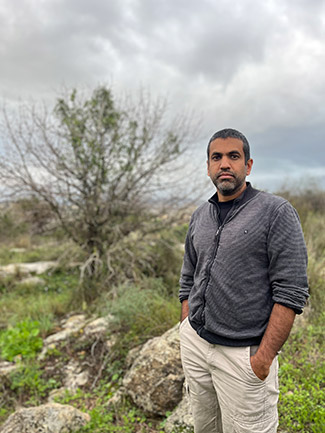
If the Hezbollah threat isn’t neutralized, Israelis who live near Lebanon wonder how they will be able to return home and feel safe.
“The big question isn’t when we’ll go back but if at all,” said Galit Yosef, director of the mayor’s office in Metula, Israel’s northernmost town, which is surrounded by Lebanon on three sides. “If we return home, we know we’ll be slaughtered one day. We’ll have October 7 in the North.”
Yosef’s house was severely damaged by the force of the blast when her neighbor’s home was hit by a direct strike, but she hasn’t been able to assess the damage because the army has deemed it too dangerous to visit. About 130 homes in Metula have suffered damage, roads and fields have been ground up by tanks, and public buildings have been repurposed for military use. Even when Yosef, who is staying at a hotel in Tiberias, is permitted to go home, her house won’t be habitable.
As they wait, Israel’s refugees are scattered about the country, their lives upended.
At first, most of the refugees went to hotels—some on the first day of the attack after running from home in their pajamas.
Ofir Reuven fled her house in Yevul, a tiny town near the corner of Egypt, Israel and Gaza, early on the morning of October 8, driving with friends and family through agricultural fields in three 4×4 vehicles with more passengers than seats.
“We got into the car without toothbrushes, with nothing. We felt we had to zip out of there,” said Reuven, a mother of five. “My kids were barefoot. I didn’t even have a purse. I had a prayerbook and my husband had his gun. That’s all we brought.”
They drove to the Dead Sea, where Reuven’s 11th-grade daughter had fled after escaping the bloodbath at Kibbutz Be’eri, where she had been spending the weekend with friends. Over 90 people were murdered at Be’eri and 25 taken captive to Gaza. The family ended up at a youth hostel at the foot of Masada, the remote desert fortress where 2,000 years ago besieged Jewish holdouts committed mass suicide to avoid capture, murder and enslavement by Roman troops—an extreme act that suddenly seems more relatable after the experience of Hamas’s atrocities on October 7.
Over the course of the next few days, Reuven became the de facto leader of Yevul’s community in exile. She sent messages to friends and neighbors that they’d find refuge at Masada’s Ana youth hostel, and eventually over 80 percent of the community arrived. The government announced that it would foot the bill for all evacuees’ hotel stays, including three meals per day. The Masada hostel wasn’t equipped to provide meals—it just had a couple of vending machines—but someone donated an oven, and on that first Friday community members baked challah together. Families slept five or six people to a room, using the lobby as a common living room.
The Education Ministry set up a school, and thanks to an army of volunteers and a flood of donations, the refugees were able to get shoes, clothes and toiletries at the nearby Dead Sea resort area of Ein Bokek, where thousands of displaced persons were put up in hotels.
“Everything that arrived at the beginning made me cry from emotion,” Reuven recalled. “The generosity of Am Yisrael was a huge thing—so special, so meaningful. It created a lot of hope.”
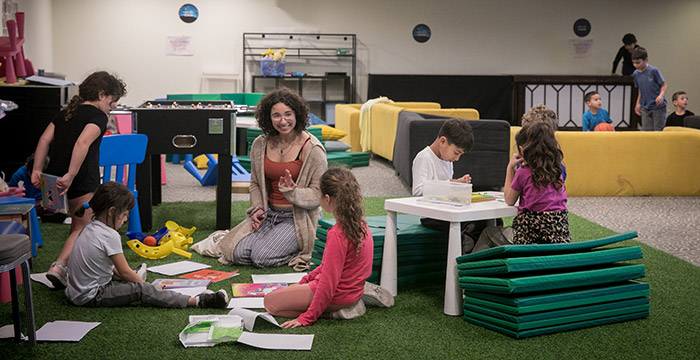
Photo by Miriam Alster/Flash90.
Most displaced communities relocated together to help preserve a sense of unity and resilience amid the trauma of war. Those under evacuation orders can choose either free room and full board at hotels or instead take the government payout—about $55 a day per adult and half as much per child—and make their own housing arrangements. Local schools have opened their doors to evacuees, and where there were none the Education Ministry set up temporary ones. Evacuees also have received free psychological counseling, free public transportation and a range of other services.
“Being together as a community holds us together on a mental-health level—it really strengthens us,” Zohar said. “Community is a powerful thing at all times and certainly in moments of crisis.”
But living for months in hotel rooms, even nice ones, is no picnic, especially for families. Four or more people may be forced to share one bathroom. There are lines for doing laundry. Hotel halls are littered with bikes, baby carriages and restless kids in every corner. Food is available only at set times, and it’s not to everyone’s liking. Many hotels don’t allow pets. High school kids are skipping school and staying up all night with friends.
Over time, refugee hotel occupancy has dwindled. Of Metula’s 1,600 residents in exile, about 80 percent have left the hotels and are using government funding to rent apartments on their own, according to Yosef. At the Maccabim youth hostel, which initially hosted over 20 families from Tkuma and nearby towns, including Sderot, about half remain.
Tkuma resident Anat Ifrach is of two minds when it comes to returning home. She has visited Tkuma since the war began, but the town felt desolate and unsafe. The preschool where she works will remain shuttered at least until September, and for the time being she has taken a similar job at a school in Modiin. The end date of government payments for evacuee housing keeps changing, and living with the uncertainty has been difficult. On top of everything, Ifrach is concerned about security.
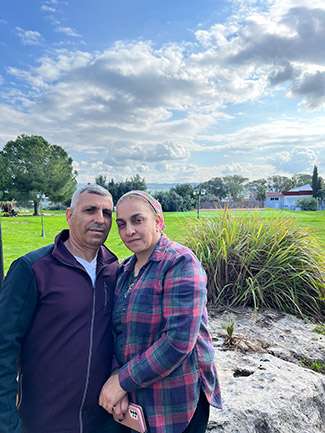
“I look at this process like it’s from a movie. I don’t know how we reached this point,” Ifrach said, noting that in an instant her family went to war footing, with her son a commander in a tank unit and her son-in-law an elite combat officer. “It’s not simple at all. We’re worried. We don’t know what will be. We’re left in the same place we were before October 7. We got used to these rounds of fighting, but the knowledge that they were able to infiltrate us makes us question our security.”
In the North, residents are unclear on when their return date will be.
“The situation has to change. It can’t go back to the same as before,” said Yitzhak Cohen, a vintner from Ramot Naftali, a leafy Galilee town on a mountain just over a mile east of the Lebanon border. Cohen chose to remain in his home. “The state has to deal with the problems and not evacuate,” he said, but almost everyone else in town picked up and left, including Cohen’s wife.
“Either there will be a large campaign that will push Hezbollah back from the border area or there will be a political agreement. Neither the leaders in the region nor the residents will agree to live with Hezbollah under their nose, waiting for next time,” Cohen said. “And there’s no updated information on when the evacuees should return.”
Meanwhile, many displaced adults are idle because their workplaces are shuttered. One reason for Cohen’s decision not to evacuate is his work. “I have a business in the moshav,” the winemaker said. “So there’s work. It’s not boring. I pity all the people who are climbing the walls in hotels.”
At the same time, the displaced are paying mortgages and rent on empty homes. Those who want to move permanently and sell their homes in the South or North have dim prospects of finding buyers given the circumstances.
“Our economic future is uncertain,” said Reuven, who has since coordinated a relocation of the Yevul community in exile from the Masada hostel to a nicer hotel closer to home near Sde Boker.
Yohanan of Netiv HaAsara says Israel should get used to communities in exile, and the state should assist people no matter where they ultimately choose to live.
“There’s no one answer to our problems,” Yohanan said. “Our communities are no longer just a geographic place—just like nobody will say the Jewish people is the Land of Israel.
“Our reality has changed.”
Uriel Heilman is a journalist in Israel. He works for the Jewish Telegraphic Agency and has written about Israel’s current war for the Los Angeles Times, Salon and USA Today.








 Facebook
Facebook Instagram
Instagram Twitter
Twitter
Randi Stein says
I lived in Kibbutz Menara from 1974-1978, with my husband and two young children. Their first language was Hebrew, as they were 3 and 2 when we arrived. I have nothing but good memories from our years there. Rachel Rabin was the head of the school during the years I taught English to grades 4-7. My husband David was the kibbutz gardener and volunteer co-ordinator. If there is anyway I can help Menara’s evacuees now, I would be grateful to be able to offer any kind of assistance I can– financial or otherwise.